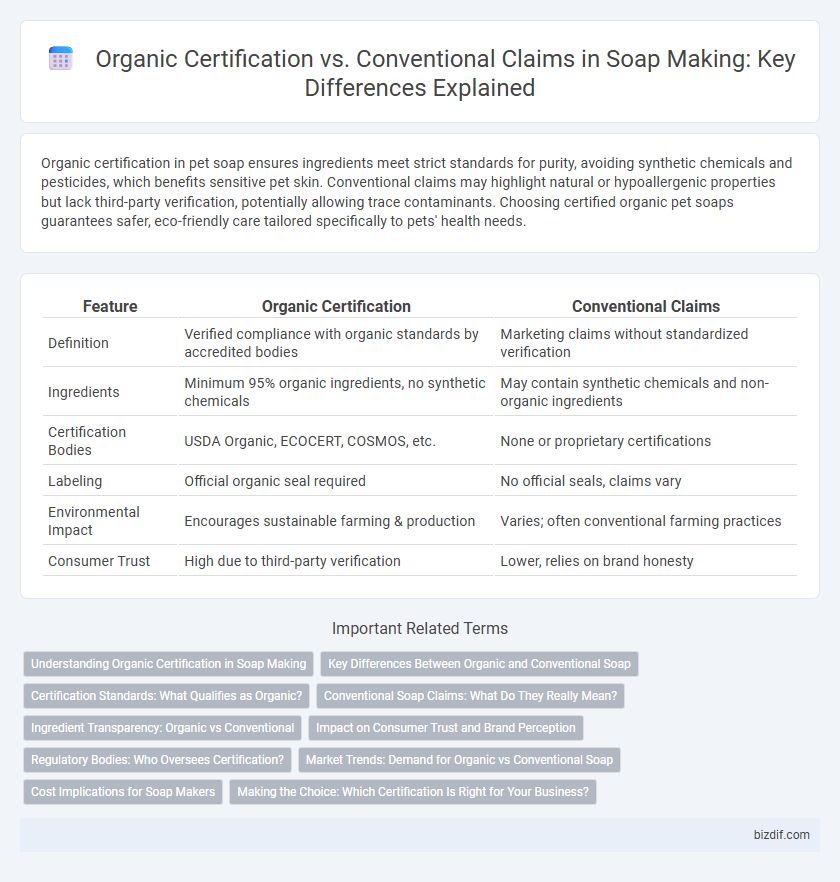Organic certification in pet soap ensures ingredients meet strict standards for purity, avoiding synthetic chemicals and pesticides, which benefits sensitive pet skin. Conventional claims may highlight natural or hypoallergenic properties but lack third-party verification, potentially allowing trace contaminants. Choosing certified organic pet soaps guarantees safer, eco-friendly care tailored specifically to pets' health needs.
Table of Comparison
| Feature | Organic Certification | Conventional Claims |
|---|---|---|
| Definition | Verified compliance with organic standards by accredited bodies | Marketing claims without standardized verification |
| Ingredients | Minimum 95% organic ingredients, no synthetic chemicals | May contain synthetic chemicals and non-organic ingredients |
| Certification Bodies | USDA Organic, ECOCERT, COSMOS, etc. | None or proprietary certifications |
| Labeling | Official organic seal required | No official seals, claims vary |
| Environmental Impact | Encourages sustainable farming & production | Varies; often conventional farming practices |
| Consumer Trust | High due to third-party verification | Lower, relies on brand honesty |
Understanding Organic Certification in Soap Making
Organic certification in soap making ensures that the ingredients comply with strict agricultural and processing standards set by recognized bodies such as USDA Organic or COSMOS. This certification verifies that raw materials, including oils and botanicals, are grown without synthetic pesticides, GMOs, or harmful chemicals, guaranteeing product purity and environmental sustainability. Understanding these standards helps artisans create genuinely organic soaps, distinguishing them from products labeled with unregulated conventional claims.
Key Differences Between Organic and Conventional Soap
Organic certification in soap making requires the use of ingredients grown without synthetic pesticides, fertilizers, or genetically modified organisms, ensuring a natural and eco-friendly product. Conventional soap often contains synthetic detergents, chemical preservatives, and artificial fragrances, which can cause skin irritation and environmental harm. Key differences include ingredient sourcing, production transparency, and impact on skin health and the environment, with organic soaps emphasizing sustainable and non-toxic components.
Certification Standards: What Qualifies as Organic?
Organic certification in soap making requires compliance with strict standards set by organizations such as USDA Organic and COSMOS. These standards mandate the use of ingredients grown without synthetic pesticides, herbicides, or genetically modified organisms, ensuring product purity and environmental sustainability. Conventional claims often lack rigorous verification and may include synthetic additives, making certified organic soaps more trustworthy for consumers seeking natural and eco-friendly options.
Conventional Soap Claims: What Do They Really Mean?
Conventional soap claims often focus on attributes like "antibacterial," "moisturizing," or "dermatologist-tested," but these terms are not always regulated, leading to potential consumer confusion. Unlike organic certification, which requires strict adherence to ingredient sourcing and processing standards, conventional claims can be used more loosely and may not guarantee natural or safe ingredients. Understanding the difference between marketing language and scientifically backed certifications is crucial for making informed choices in soap selection.
Ingredient Transparency: Organic vs Conventional
Organic certification in soap making mandates rigorous ingredient transparency, ensuring all components are verified organic and free from synthetic chemicals. Conventional claims often lack strict ingredient disclosure, allowing the use of synthetic additives without full transparency. Consumers prioritizing purity and sustainability typically favor organic labels for clearer and more reliable ingredient information.
Impact on Consumer Trust and Brand Perception
Organic certification in soap making significantly enhances consumer trust by assuring the use of natural, sustainably sourced ingredients verified by recognized standards. Conventional claims without certification may raise skepticism due to potential ambiguities in ingredient sourcing and processing methods. Brands with organic certification typically experience stronger brand loyalty and a positive perception of transparency and environmental responsibility.
Regulatory Bodies: Who Oversees Certification?
Organic soap certification is overseen by regulatory bodies such as the USDA National Organic Program (NOP) in the United States and the European Union's organic certification authorities, ensuring compliance with strict organic farming and processing standards. Conventional soap claims, on the other hand, fall under general consumer product regulations managed by agencies like the FDA or the Consumer Product Safety Commission (CPSC), focusing mainly on safety and labeling rather than ingredient sourcing. These differing regulatory bodies impact how soap makers formulate, label, and market their products to meet specific organic or conventional standards.
Market Trends: Demand for Organic vs Conventional Soap
The demand for organic soap is experiencing significant growth due to increasing consumer awareness of natural ingredients and sustainability, with market research indicating a projected compound annual growth rate (CAGR) of over 8% in the organic personal care segment by 2028. Conventional soap remains prevalent, driven by lower prices and widespread availability, but faces challenges from consumers seeking transparency and chemical-free products. Retail data shows that organic-certified soaps outperform conventional variants in specialty stores and online platforms, reflecting a strong trend towards clean beauty and eco-conscious purchasing behavior.
Cost Implications for Soap Makers
Organic certification for soap making involves rigorous testing and compliance with standards set by bodies like USDA or ECOCERT, often leading to higher costs in raw materials and certification fees. Conventional claims allow soap makers to use non-certified ingredients, significantly reducing expenses but potentially compromising market trust and pricing power. The cost implications force soap makers to balance consumer demand for organic authenticity against the financial burden of certification and production.
Making the Choice: Which Certification Is Right for Your Business?
Choosing between organic certification and conventional claims depends on your target market and business goals, as organic certification often requires adhering to strict ingredient and production standards verified by recognized bodies like USDA or COSMOS. Conventional claims, while less regulated, offer flexibility in marketing but may lack consumer trust associated with certified organic labels. Evaluating customer demand, cost implications, and brand positioning will help determine which certification aligns best with your soap-making business strategy.
Organic Certification vs Conventional Claims Infographic

 bizdif.com
bizdif.com